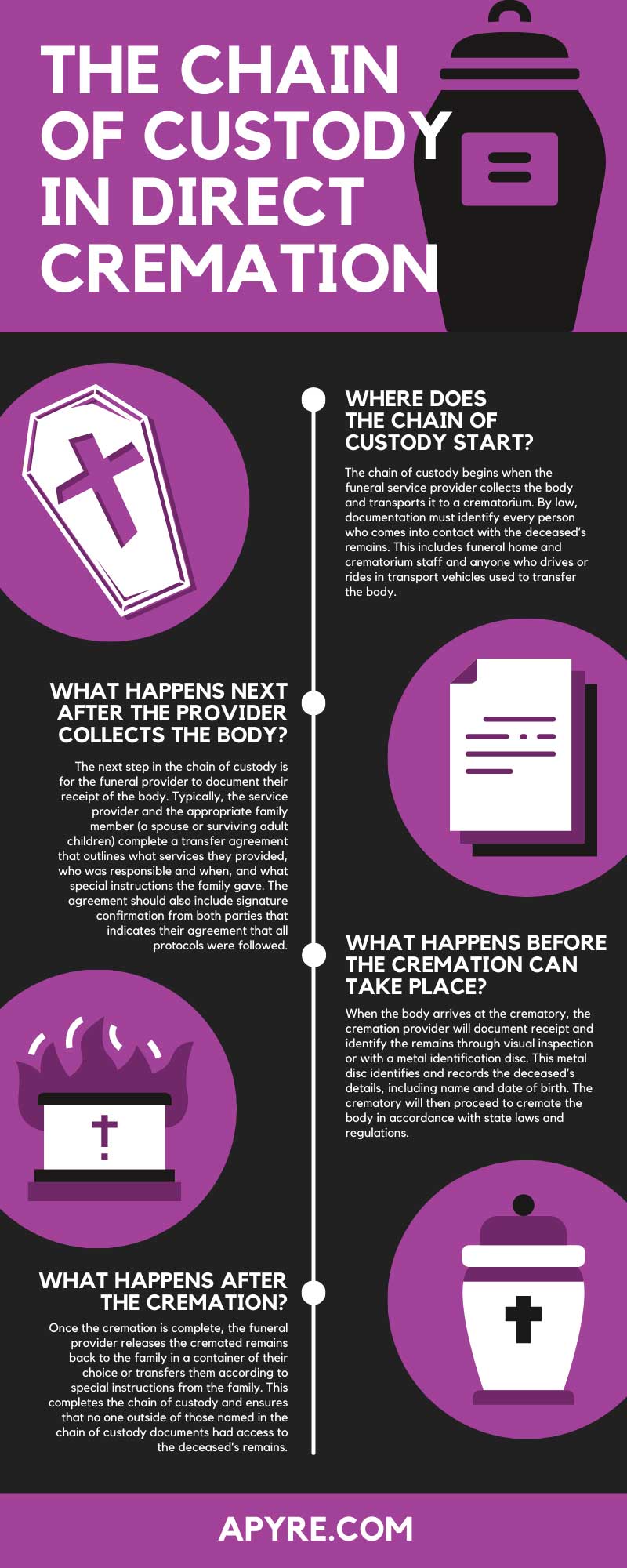The Chain of Custody in Direct Cremation

When a family chooses direct cremation, they are making an important choice about saying goodbye in their own way. While many families pursue traditional viewings, wakes, and funerals, others may prefer a simpler sendoff. Cremation has become a more popular option for families who wish to design their own ways to celebrate and remember their loved ones.
What Is Direct Cremation?
Direct cremation is a disposition option that bypasses traditional viewings and funeral services and allows families to arrange for an immediate cremation of their loved one’s remains. Direct cremations usually involve minimal preparation and display of the deceased’s body before cremation, as well as limited involvement from family members or friends during the process. This makes direct cremation a less expensive, but no less profound, option for families with limited resources or those who prefer to pay their respects in other, more personal ways.
As with any arrangements for the disposition of a person’s remains, direct cremation requires establishing a chain of custody of the body and the cremated remains. Learning about the chain of custody in direct cremation will help you understand what you should expect from a direct cremation provider.
What Is the Chain of Custody?
In order to ensure a secure and respectful transfer of a deceased person’s remains, laws require funeral homes to follow a chain of custody during direct cremation. A chain of custody is an established protocol that requires strict documentation and control over who is handling and transferring the body at all points throughout the process.
Where Does the Chain of Custody Start?
The chain of custody begins when the funeral service provider collects the body and transports it to a crematorium. By law, documentation must identify every person who comes into contact with the deceased’s remains. This includes funeral home and crematorium staff and anyone who drives or rides in transport vehicles used to transfer the body.
What Happens Next After the Provider Collects the Body?
The next step in the chain of custody is for the funeral provider to document their receipt of the body. Typically, the service provider and the appropriate family member (a spouse or surviving adult children) complete a transfer agreement that outlines what services they provided, who was responsible and when, and what special instructions the family gave. The agreement should also include signature confirmation from both parties that indicates their agreement that all protocols were followed.
What Happens Before the Cremation Can Take Place?
Once at the crematorium, the deceased’s spouse, adult children, next closest relative, or the individual designated in the person’s will signs a cremation authorization form to certify that the responsible person has given consent for the cremation process. The crematorium must keep this document on file in order to guarantee the facility has met all legal requirements before the cremation can take place. This protocol helps ensure the deceased is given the respect and care they deserve during the direct cremation process.
When the body arrives at the crematory, the cremation provider will document receipt and identify the remains through visual inspection or with a metal identification disc. This metal disc identifies and records the deceased’s details, including name and date of birth. The crematory will then proceed to cremate the body in accordance with state laws and regulations.
What Happens After the Cremation?
Once the cremation is complete, the funeral provider releases the cremated remains back to the family in a container of their choice or transfers them according to special instructions from the family. This completes the chain of custody and ensures that no one outside of those named in the chain of custody documents had access to the deceased’s remains.
The container is designed to protect the body during transport and meet all cremation regulations. The family can choose an affordable basic container or one that more closely reflects the deceased’s personality.
How Does the Family Know They Received the Correct Remains?
A funeral provider’s responsibility in the chain of custody doesn’t end with releasing the ashes. They must also maintain records and documentation that legally confirms that they released or transferred the correct remains of the deceased to the family. This information should include a copy of all documents signed throughout the process as well as an identification number assigned to the deceased’s ashes.
The metal tag bearing the identification number remains with the cremated remains throughout the entire process, including during the delivery of the cremated remains to the family. The metal tag helps ensure the family can be certain they are receiving the correct ashes of their loved one.
The chain of custody during direct cremation serves to protect the deceased’s remains and uphold their dignity throughout the process. It also ensures the provider follows applicable laws and regulations so that grieving families can have peace of mind in knowing that the service provider treated their loved one with the utmost respect during this time.
Although direct cremation may seem straightforward, it is important for families to understand the chain of custody in direct cremation. Always discuss how a provider complies with chain of custody requirements before selecting them to collect remains and provide cremation services.
Apyre National Cremation Services provides inexpensive cremation services in Pennsylvania. Our professional, licensed funeral director speaks directly with families and ensures their loved one is treated with respect throughout the entire process.
With Apyre, bereaved family members needn’t travel to an office to sign papers; we can do all the paperwork electronically. You’ll never have to endure a sales pitch pressuring you to buy services and accessories you don’t need, or that your loved one wouldn’t have wanted. We can usually deliver cremated remains to you in a receptacle of your choice within three days of collecting your loved one’s body.
Apyre currently provides direct cremation services in Pennsylvania, New Jersey, Indiana, West Virginia and Florida. If your loved one lived in and passed away in one of these states, and you are unable to travel to arrange for the disposition of their remains, call Apyre. We can take care of all the details while reassuring you and handling everything with professionalism and respect, according to all applicable laws and regulations.
Knowing the steps involved in direct cremation can help families choose a provider that will handle their loved one with dignity and care throughout the entire process.




